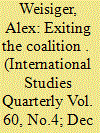|
|
|
Sort Order |
|
|
|
Items / Page
|
|
|
|
|
|
|
| Srl | Item |
| 1 |
ID:
151283


|
|
|
|
|
| Summary/Abstract |
When do countries abandon coalition partners during war? Prominent arguments about alliance dissolution focus on peacetime, yet the ability of alliances to influence international politics ultimately hinges on their cohesion or dissolution during war. In this article, I argue that battlefield circumstances heavily influence the likelihood of defection from coalitions. First, countries fighting independently from their partners make attractive candidates for wedge strategies and hence are more likely to defect. Second, coalitions are more likely to collapse when their members see victory in the overall war as less likely. These predictions contrast with common expectations from theories of the balance of power and of collective action. I test hypotheses about wartime developments statistically using new time-varying data on both front-level troop contributions and battle deaths. Consistent with theoretical predictions, countries are more likely to abandon coalition partners if fighting alone and when the coalition fares worse in recent fighting.
|
|
|
|
|
|
|
|
|
|
|
|
|
|
|
|
| 2 |
ID:
100986


|
|
|
|
|
| Publication |
2010.
|
| Summary/Abstract |
This article analyzes Japan's labor market reform in response to its protracted recession, focusing on the institutional configuration of policymaking. It argues that although the centralization of decision-making authority bypassed bureaucracy-led policymaking, policy coordination with coalition partners and political compromise with opposition parties prevented across-the-board labor market deregulation in Japan.
|
|
|
|
|
|
|
|
|
|
|
|
|
|
|
|
| 3 |
ID:
131703


|
|
|
|
|
| Publication |
2014.
|
| Summary/Abstract |
Even before the global financial crisis restored the International Monetary Fund's ('IMF' or 'Fund') political fortunes, the 'monetary managers' regained ground in supposedly hostile parts of the world, most notably in sub-Saharan Africa. To shed light on the Fund's appeal to governments that do not need its leverage to put dithering cabinets, unruly coalition partners, or restive opposition forces in line, this article examines the interplay between intergovernmental organisations (IGO) and the 'master institutions' of the anarchical society. It builds on classic English School inquiries into the 'words and deeds' of agents that define, maintain, and transform international societies; tracks collective efforts to harness international credit and debt; and probes bureaucratic obstinacy and great power management in the Fund's conduct in three member states that differ in terms of their borrowing habits, funding options, and creditor relations. It concludes that, in contrast to its reputation as a technocratic manager of cooperation or an imperial agent of contestation, the IMF's appeal lies in its willingness to act as a diplomatic champion of coexistence.
|
|
|
|
|
|
|
|
|
|
|
|
|
|
|
|
| 4 |
ID:
131705


|
|
|
|
|
| Publication |
2014.
|
| Summary/Abstract |
Even before the global financial crisis restored the International Monetary Fund's ('IMF' or 'Fund') political fortunes, the 'monetary managers' regained ground in supposedly hostile parts of the world, most notably in sub-Saharan Africa. To shed light on the Fund's appeal to governments that do not need its leverage to put dithering cabinets, unruly coalition partners, or restive opposition forces in line, this article examines the interplay between intergovernmental organisations (IGO) and the 'master institutions' of the anarchical society. It builds on classic English School inquiries into the 'words and deeds' of agents that define, maintain, and transform international societies; tracks collective efforts to harness international credit and debt; and probes bureaucratic obstinacy and great power management in the Fund's conduct in three member states that differ in terms of their borrowing habits, funding options, and creditor relations. It concludes that, in contrast to its reputation as a technocratic manager of cooperation or an imperial agent of contestation, the IMF's appeal lies in its willingness to act as a diplomatic champion of coexistence.
|
|
|
|
|
|
|
|
|
|
|
|
|
|
|
|
|
|
|
|
|